I was fortunate to have a poster presentation Pathways to practice change: how to use implementation science theories, models, and frameworks, as well as an oral presentation, Accelerating the implementation of evidence: core competencies for implementation practice with co-authors Sobia Khan from the Center for Implementation and with Diana Kaan and Louise Zitzelsberger from Health Canada. Both presentations highlighted ways we can better bridge the gap between implementation research and practice. In one session, we presented work from The Center for Implementation in which we consolidated six existing core competency documents designed for implementation support practitioners into a newly compiled set of implementation practice core competencies.
In the other session, we described ways in which implementation practitioners can use the theories, models, and frameworks from implementation research to guide how they design interventions for implementation, and then plan for the implementation, spread, and scale up of those interventions. Both of these reflect the basis of our project work and the online courses and workshops we deliver by bridging the gap between research and practice. This is a priority of the work we do and is further exemplified by the online mini-course we offer for free called Inspiring Change 2.0: Creating impact with evidence-based implementation, which in 1.5 hours teaches the foundations of how to use implementation science to inform change efforts.
The most positive and inspiring part of the conference, for me, was how engaged and thoughtful other conference delegates were. They were interested in these topics, asked amazing questions, contributed new ideas, and wanted to use this information to inform their own work. For example, there was great interest in expanding how implementation practitioners (those responsible for designing and delivering programs in health and public health) can be supported to apply implementation science in practice. There was a desire to expand on the building momentum in this area.
Also, I falsely assumed that the virtual setting of the conference would primarily only allow for the sharing of content, but not provide great networking opportunities relative to an in-person conference. However, that turned out not to be the case at all for me. As attendees asked compelling questions, we would also have side conversations in the Zoom chat box. I was able to connect with multiple attendees after the conference to discuss opportunities to collaborate and learn from each other. In some ways, being able to see a person’s name attached to each question in Zoom made it easier to identify those with whom I had synergies.
The entire 3rd UK Implementation Science Research Conference experience left me feeling positive and inspired about the future of implementation work. I’m excited to participate in future UK Implementation Science Research conferences, virtually or in person.
Twitter: @Julia_E_Moore
